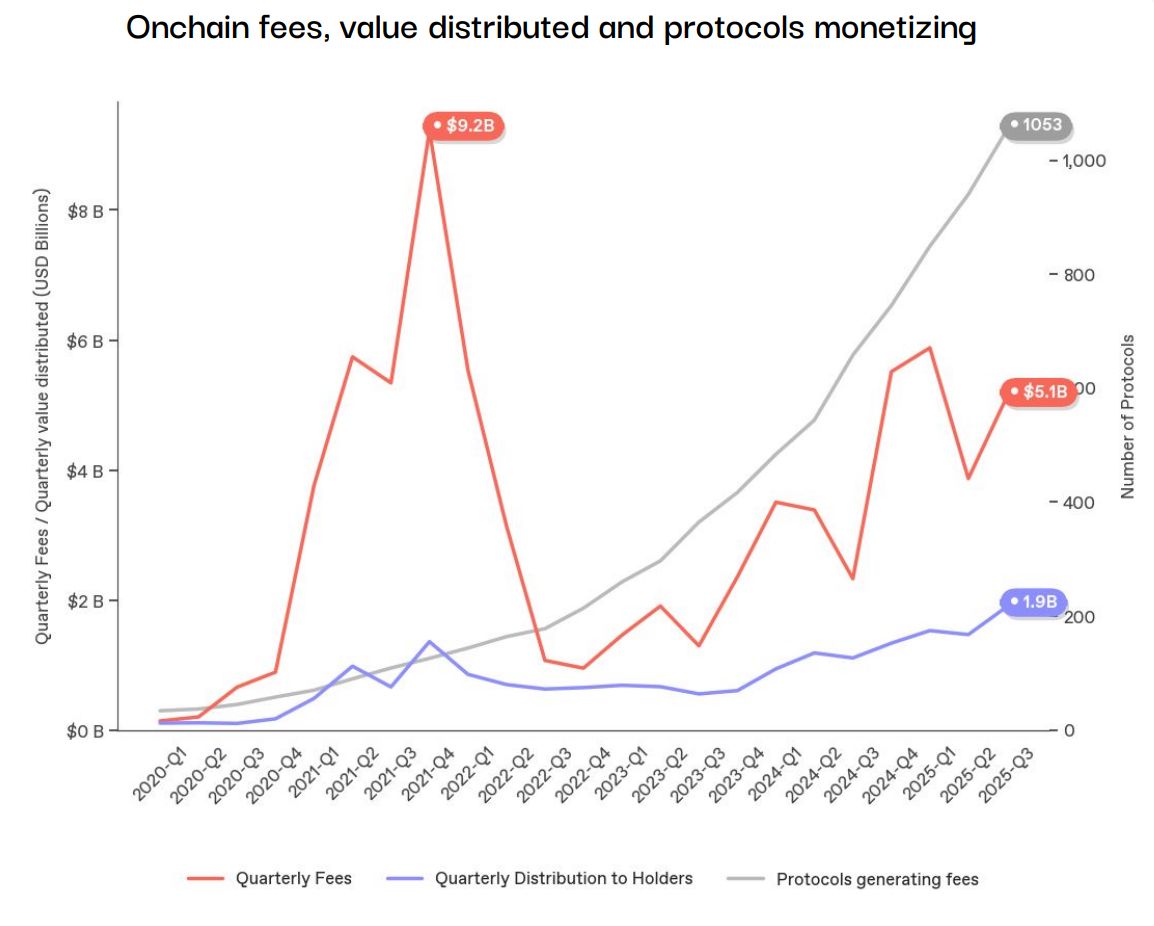On-Chain Revenue Hits $20 Billion in 2025 as DeFi Drives Growth
On-chain revenue has grown to $20 billion in 2025, driven mainly by decentralized finance (DeFi) platforms, according to a new report by crypto investment firm 1kx.
Users paid roughly $9.7 billion in on-chain fees in the first half of 2025, up 41% from the same period last year and the highest H1 total on record. DeFi accounted for 63% of all fees, led by trading activity on decentralized exchanges (DEXs) and derivatives platforms.

Despite this growth, 2021 remains the historical peak, though on-chain fees have grown more than tenfold since 2020, representing a compound annual growth rate of roughly 60%.
The report cites blockchain technology as becoming more stable and reliable, helping earnings remain steady even as user fees are lower than in the past. Better efficiency and cheaper infrastructure are also helping drive overall revenue growth.
“On-chain fees, though still a minority of industry income, offer clear signals of adoption and long-term value creation: 2025 YtD has close to 400 protocols with $1M+ ARR, and 20 passing over $10M in value to their token holders,” the report reads. “This is enabled by blockchain’s global reach and rising efficiency, which allow applications to scale rapidly and profitably.”
DEXs like Raydium and Meteora benefited significantly from Solana’s surge this year, while Uniswap lost market share, dropping from 44% to 16%. In derivatives, Jupiter increased its fee share from 5% to 45%, and Hyperliquid, launched less than a year ago, now accounts for 35% of category fees.
Lending remains dominated by Aave, the largest DeFi protocol with a total value locked (TVL) of $39 billion. Meanwhile, Morpho, a lending aggregator with a TVL of $8.25 billion, increased its share to 10% from nearly zero in H1 2024.
Looking ahead, total on-chain revenue is expected to rise to more than $27 billion in 2026, the authors predict, driven by new technologies and clearer regulations like the GENIUS Act.
“Applications are scaling faster and larger than ever with increasing value distribution, while regulatory clarity supports broader investor participation,” the report concludes. “As the relationship of fees and valuations for applications shows, on-chain economics have entered a more mature phase where fundamental fee metrics warrant close attention from investors.”
Disclaimer: The content of this article solely reflects the author's opinion and does not represent the platform in any capacity. This article is not intended to serve as a reference for making investment decisions.
You may also like
U.S. and China Reach Rare Earth Agreement: One Year of Stability Despite Ongoing Competition
- China suspended new export controls on rare earths and other materials for one year, easing U.S.-China trade tensions via a Trump-Xi agreement. - The deal includes U.S. tariff rollbacks and China halting investigations into semiconductor firms like Nvidia , with provisions expiring in 2026. - Experts warn China's 90% refining dominance and low-cost production ensure its strategic leverage remains unchallenged despite temporary concessions. - U.S. rare earth stocks rose, but analysts stress global supply

Bitcoin Updates: Clash Between State Legislation and Community Interests: Texas Community Fails to Enforce Regulations on Bitcoin Mining Operation
- Mitchell Bend, Texas residents rejected incorporation by 25% to regulate a Bitcoin mine's noise pollution, highlighting tensions between crypto operators and communities. - Marathon Digital Holdings opposed the move, filing a 47-page lawsuit claiming it violated state law and would harm operations, but a federal judge denied its restraining order request. - Proponents vowed to continue legal battles through Earth Justice, citing health complaints like sleep disturbances and nausea linked to the mine's co

Bitcoin Updates: Texas Community's Attempt to Control BTC Mining Falls Short, Underscoring Ongoing Regulatory Hurdles for the Industry
- Hood County voters rejected Mitchell Bend's incorporation bid by 25%, blocking noise regulations on MARA's Bitcoin mining facility. - MARA sued over petition flaws, claiming the proposed city aimed to "regulate it out of business," but the case was dismissed before the vote. - Residents cited environmental concerns while MARA implemented noise mitigation measures, highlighting tensions between crypto mining and local communities. - The outcome underscores regulatory challenges for Texas-based miners as l

Lina Khan will serve as co-chair for the transition team of New York City’s incoming mayor, Zohran Mamdani
